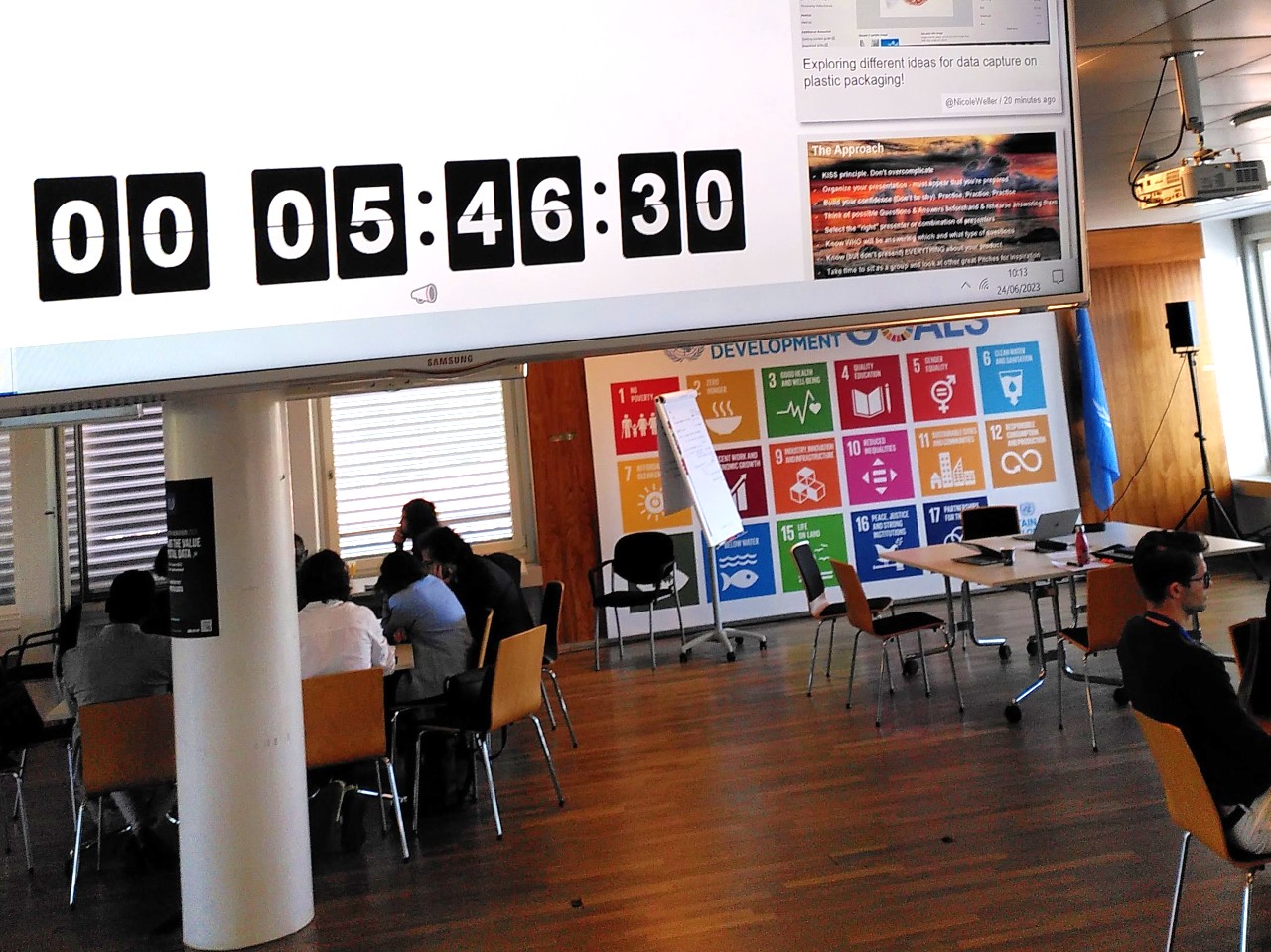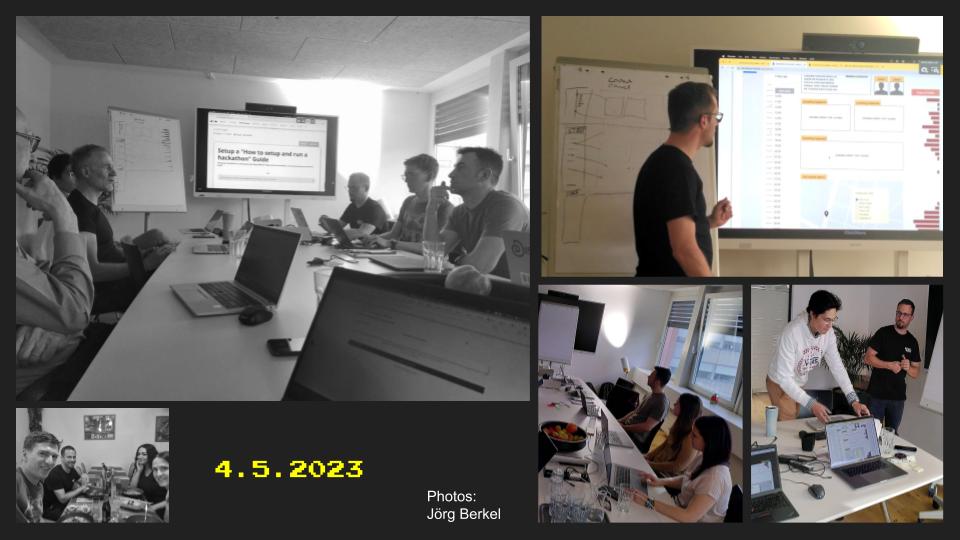DRIBD(at): a brief history
---
**:wave: Hello, world!** The goal of this document is to put a timeline of the origins of the `dribdat` open source platform and DRIBD@ collective, together with aspirations for the future. To weave the 'red thread', so to speak - and share some perspective.
# Contributing
0. Join the [OpenCollective](https://opencollective.com/dribdatcoop)
1. Start a pull request on [Codeberg](https://codeberg.org/dribdat/coop/src/branch/main/join.md)
1. Drop a bio into the [People](#people) section below
1. Find us at a hackathon (see [calendar](https://schoolofdata.ch) & [stay tuned](https://everyhack.day)!)
0. Friendly [comments](mailto:dribdat@datalets.ch) are always welcome :speech_balloon:
## The time is right.

_Dribdat in action at the first [UPU hackathon](https://opendata.ch/events/upu-postal-data-hackathon-2023/)_
Today the Internet is full of [buzz](https://hn.algolia.com/?dateRange=all&page=0&prefix=false&query=hackathon&sort=byDate&type=story) and [blog posts](https://blog.datalets.ch/tag/hackathon/) on the subject of hackathons. We have passed the [peak hype](https://tooting.ch/@loleg@fosstodon.org/111591945307714926) and are entering the valley of sustainable impact. People are deeply thinking and wroting about [maximizing the fun](https://forum.opendata.ch/t/make-the-most-of-hackathon-season/167), [advocating for fairness](https://hacknight.dinacon.ch/project/23), getting a foothold as [open data contributor](https://github.com/loleg/earnopendata/blob/master/GUIDE.md), among other topics. This has interested artists and researchers for years (see timeline below), who came to participate, talk to the organizers and teams, ask for access to results and statistics. They have piqued our own curiosity to better quantify and understand the playing field. Current questions around co-optation and access to people, data and technology, are more relevant than ever.
## Lead with purpose.

_A challenge being presented at [Hack4SocialGood 2023](https://bd.hack4socialgood.ch/event/4)_
We are familiar with non-profit associations in Switzerland who organize events to support open access (e.g. CH Open), digital sustainability (DINAcon), hackable devices (MakeZurich), multimedia experiences (PlayBern, Echtzeit), digital literacy (School of Data), etc. There are a number of academic groups and global networks ([OKFN](https://okfn.org), [TTN](https://thethingsnetwork.org), [MHL](https://stories.mlh.io/about), etc.) that heavily leverage hackathons as an education and recruitment format. These are being increasingly leveraged in wider non-profit sector ([Hack4SocialGood](https://hack4socialgood.ch)), with notable examples in supporting migrants ([Powercoders](https://powercoders.org)) and women ([Hack'n'Lead](https://www.womenplusplus.ch/hackandlead)). Among their supporters are community champions, maintaining software and creating content, eager to serve them as volunteers, connectors and accelerators.
## Work in public.

_Impressions of the first [Hack:Org:X event](https://hackmd.io/@oleg/hack-org-x) in Basel_
In 2023, we proposed an open cooperation across hackathon organizers called [DRIBD@](https://hackorgx.dribdat.cc/project/3), which could govern open source initiatives, and create other instruments of alignment and collective resourcing in the community. Anyone can join and support this effort, especially people who want to improve the experience of citizen contributors, to derive more value from hands-on, digitally-supported volunteering for various causes. In the open source project [Dribdat](https://dribdat.cc) (see ▶️ [the pitch](https://md.coredump.ch/p/PXwbKKPAp#/)), we develop shared value, an expression of encoded expertise, a data standard and basis for continuing this work.
# R&D
A Swiss Innovation Agency (107.424 IP-SBM) research study is about to start on the social impact of hackathons. This will put a spotlight on the unique value propositions of a hackathon platform as a mechanism of diversity-building civic participation, and build a more solid foundation for future events through field work, evaluation, modelling, and development. Here is a short overview of our plans, from a technical perspective.
**Collaborative Knowledge Base**
In collaboration with experts from the fields of economics, sociology, and psychology, we plan to continue building a virtual library of current literature related to refugee integration into tech as a labor market, and how this relates to building digital-focused communities. This will inform our strategic planning and decision making processes. By inviting exchange with stakeholders across multiple industry domains, we envision creating a [knowledge graph](https://know.dribdat.cc/) of hackathon concepts that promotes mutual understanding.
**High Diversity Recruitment Strategy**
To effectively reach out to a diverse audience, we will leverage the networks and activities of organisations that include [Powercoders](https://powercoders.org) and [Capacity](https://www.capacityzurich.ch/) - digital talent and social entrepreneurship platforms. Through targeted communication campaigns, we hope to attract new talent and promote awareness to a wider audience who may appreciate the impact of technology, and be interested in gaining more exposure to topics like data protection and artificial intelligence. With better credentials, we would aim to sharpen the expectations of participants. Being part of a research study may incentivise self-reflection and critical interest on the part of organizers.
**Data Collection & Evaluation**
The Bern University of Applied Sciences (BFH.ch) and Swiss chapter of Open Knowledge (Opendata.ch) will partner to collect, process, analyze and publish data from all open, participating hackathons. Our goal is to provide insights into the impact of events and digital platforms on both individuals and society as a whole. Crucial to this is being able to consistently embed pre-event and post-event questionnaires, and aggregate indicators from the whole duration of an event. This has until now not been done in a consistent way across topics.
**Team Formation Algorithm Development**
Working with the University of Zurich (UZH.ch), we will develop adaptations to [Dribdat](https://dribdat.cc) and related software projects (see [awesome-hackathon](https://github.com/dribdat/awesome-hackathon/#readme)). In this, we will evaluate a deferred acceptance algorithm with hopes of generating diversity with stability (of teams / interpersonal structures). The project could be a stepping stone to later follow-up on testing and comparing AI approaches to suggested teams. Algorithms to optimize team formation based on diverse criteria such as skills, interests, and cultural background have already been used in hackathons. Studying this will help to augment fair representation and increase engagement among all participants. Prioritizing responsible research practices, we will seek formal approval from the Ethics Review Board to conduct our activities in compliance with relevant regulations and guidelines.
**Expected Outputs**
Based on work with focus groups, the evaluation of the data and algorithm development, we aim to make significant improvements to the content and configuration of our platforms. We also expect wholly new tooling to be developed and built as open source components, that will allow more fair, sustainable, and effective hackathons in the future.
In summary, the main outputs are:
1. An optional team suggestion algorithm that should maximize participant satisfaction and diversity in teams;
2. A standard question bank for post-event evaluation that organizers can draw on—making also their events comparable to others;
3. A software infrastructure allowing the systematic analysis of individual, team, and event data from registration to participation and post-event evaluation.
# Timeline
Here is a look back from the roots of the Dribdat initiative:
| Year | Milestone |
| ---- | --------- |
| 2011 | We started running [Open Data Hackdays](https://blog.datalets.ch/open-finance-data-hackdays-in-march-2013/) in Switzerland, after a history of running [hackerspaces](https://wiki.oxhack.org) and participating in such events in Canada, UK & USA. |
| 2012 | Customized a DokuWiki at [make.opendata.ch](https://make.opendata.ch/wiki) to combine datasets, event listings and project reports from the community. |
| 2015 | Worked with Swisscom on the first [IoT Hackathon](https://blog.datalets.ch/an-internet-of-open-things-to-tell-stories/), receiving a grant & access to their Pirate Hub to develop Dribdat alpha. |
| 2017 | Started running Swiss hackathons dedicated to Open Networking and DIY electronics, with [now.makezurich.ch](https://now.makezurich.ch/) used to share knowledge and results. |
| 2016 | Created [Dridbot](https://github.com/dribdat/dridbot) together with the [Climathon](https://blog.datalets.ch/023/) team - a chat interface for healthier and more streamlined events. |
| 2017 | Reworked the Dribdat code base for a 1.0 release, with a boost from the [Open Energy Data Hackday](https://hack.energy.opendata.ch/) series and nomination for a [DINAcon](https://www.netzwoche.ch/news/2017-09-21/nominierte-fuer-die-dinacon-awards-stehen-fest) Award. |
| 2018 | Cooperation with the Statistics Office in Zürich and a significant number of people on the [TWIST Hackathon](https://forum.opendata.ch/t/25-26-8-truth-within-statistics/373/4). |
| 2019 | Worked with HES-SO students to further develop the technical architecture and implement better UX in Dribdat (see [user guide](https://github.com/dribdat/design/blob/main/User%20guide.pdf), [technical guide](https://github.com/dribdat/design/blob/main/Technical%20guide%20final.pdf), and [presentation](https://web.tresorit.com/l/kiX8f#oo64odAnXTP_3DwwnDyh6Q)). |
| 2019 | Dribdat is used more widely, by groups like [BONSAI](https://github.com/BONSAMURAIS), [DayOne](https://www.dayone.swiss/community/dayone-events/health-hack/), [IPDET](https://ipdet.org/past-programs/ipdet-2020/ipdet-2020-evaluation-hackathon/teams-and-tools/the-evalhack-team/) and [OKFN](https://frictionlessdata.io/blog/2021/10/13/hackathon-wrap/). |
| 2020 | Collaboration with ResonantFrequency on a Twine-based [interactive handbook](https://dribdat.github.io/handbook/) for hackathon participants. |
| 2020 | Wrote the [certify tool](https://github.com/dribdat/certify?tab=readme-ov-file#certify) to distribute acknowledgments. Started working on the [Proxeus platform](https://hackathons.proxeus.org) for verified credentials. |
| 2020 | Our [proposal](https://github.com/dribdat/dribdat/issues/112) for `hackathon.json`, a mechanism to discover hackathon content online, is accepted by Schema.org. We quickly adopt it. |
| 2020 | Based on Dribdat designs, the [VersusVirus](https://docs.google.com/document/d/11N__S_QdUKOjGYH7i37-EfHLn0V6akfkrF06ze_mQk0/edit#heading=h.mvn5bhspv3i8) team rapidly developed and deployed a new large-scale [teambuilding application](https://github.com/dribdat/VersusVirus-App). |
| 2021 | Continued work on a new UI based on modern tooling in the form of [project backboard](https://github.com/dribdat/backboard?tab=readme-ov-file#backboard-for-dribdat).
| 2021 | Hired Koboldgames to develop a paper prototype study of a new [gamified user experience](https://koboldgames.ch/blog/2021-01-13?lang=eng). |
| 2021 | Started a [public archive](https://github.com/OpendataCH/hackopendata-archive/commits/main/) of aggregated hackathon events and project data. |
| 2022 | Published [awesome-hackathon](https://project-awesome.org/dribdat/awesome-hackathon) based on updated research and curation of resources for organizers. |
| 2023 | Tested a blockchain-verified [certification workflow](https://hackorgx.dribdat.cc/project/2) based on the Proxeus tool. |
| 2023 | Started the [Hack:Org:X](https://hackorgx.dribdat.cc) meetups, supported an international [hackathon](https://www.upu.int/en/Universal-Postal-Union/Activities/Digital-Services/Postal-Data-Hackathon) and [conferences](https://blog.datalets.ch/094/) of hackathon organizers. |
| 2024 | Founding Aletsdat GmbH to continue development of Dribdat in partnership with NGO's and public institutions, launch EveryHack.day and more! |
# People
[@loleg](https://dat.alets.ch): after fifteen years working in IT, from a PC repair shop to leading teams building enterprise software in a multinational, my focus today is on data engineering and sustainable technology. For the past decade I've worked as a freelance consultant ([Datalets](https://datalets.ch)), and as part of a team (notably at [Apps with love](https://appswithlove.com), [cividi](https://engagement.migros.ch/de/news-projekte/zusammenleben/cividi), [ETH BAUG](https://baug.ethz.ch/), [HSLU D+K](https://www.hslu.ch/en/lucerne-school-of-design-film-and-art/degree-programmes/bachelor/data-design-and-art-1/team/), [Opendata.ch](https://opendata.ch/board/)), supporting a wide range of organizations with an advanced user base. The reuse of public or shared data and collaborative workflows at Hackdays has been a great way to focus the need for better collaborative frameworks. I am fascinated with all kinds of open innovation formats, data science contests, code forges, `#needhelp` issues and, of course, _awesome_ hackathons.
---
